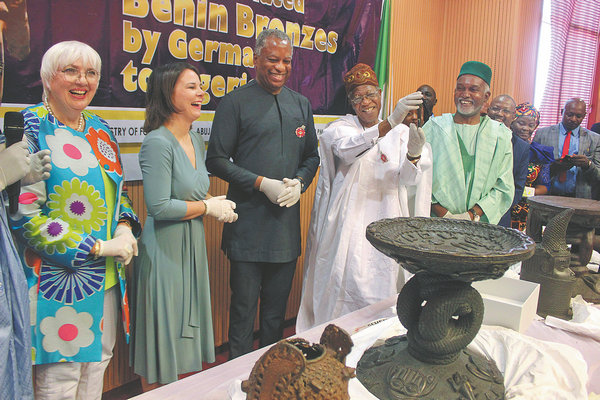

Macron's speech set the tone for a trend of repatriating artifacts to spread across Europe, with Germany following suit, Wang said.
"Since then France and Germany have begun to draft national policies for large-scale repatriation. It's not surprising that the two heavyweights in the EU have thus set an example and lead the way in sending artifacts home."
In early 2021 the Dutch government approved a plan to repatriate artifacts removed from former colonies, adopting recommendations by an advisory commission that called for the "recognition that an injustice was done to the local populations of former colonial territories when cultural objects were taken against their will".
Common act
The act of taking items from the battlefield as spoils was common during colonial campaigns. But it is also not a rare thing in modern days when war and conflict hold sway.
Huge swathes of Iraq's cultural heritage have been looted and sold since the US-led invasion 20 years ago. Thousands of artifacts are believed to have found their way onto the international art market after being removed from temples, archaeological sites and even museums.
In August 2021 the US returned more than 17,000 smuggled artifacts, including statues and carvings from ancient Mesopotamia, to the country.
The Iraqi government has said that it will "spare no effort to recover the rest of our cultural heritage throughout the world".
Zhang Zikang, director of the Central Academy of Fine Arts Museum in Beijing, said that the repatriation of artifacts has accelerated in recent years with efforts from all parties. This not only conforms to the spirit of United Nations conventions but also makes a great contribution to human civilization, Zhang said.
"Artifacts carry the genes and bloodline of a nation. They are irreplaceable and excellent resources of civilization for a country. Only by returning those precious works can they be better integrated into research and preservation of local culture."
Wang of Renmin University of China said that the about-face was not the result of an instant decision but was driven by a changing social consensus about the ethics of holding on to such items and a byproduct of Europe's reflection on its past colonial policies over a long period.
"At the same time, the world has been dealing with such issues. For instance, the return of Jewish cultural artifacts and artworks from World War II has been going on since the 1990s.
"Repatriating precious artifacts is of great significance. Europe is on the right track. The series of moves tells the world that plundering and looting are unjust and should never happen again."
There has also been a wide consensus internationally regarding protecting cultural heritage diversity, Wang said, citing two international conventions signed in 1970 and 1995 to combat the illicit trade in cultural relics and return them to their rightful owners.
Even though these conventions lack retroactive force and cannot serve as a legal basis for recovering lost historical artifacts, they establish an international moral guide and help regulate various aspects of the trade in cultural artifacts, Wang said.